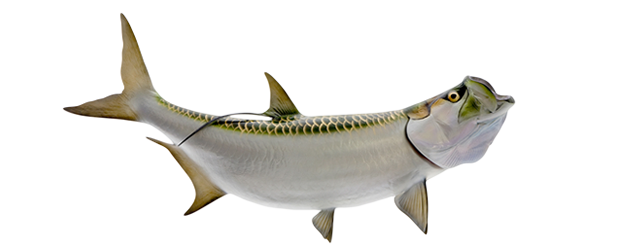Tarpon

View Regulations

Scientific Name
Megalops atlanticus


Common Names
Silver king, Sabalo


Description
Tarpon are characterized by their large mouth with a peculiar lower jaw which carries an extended bony plate. Its coloration, depending on its origin, ranges from green-blue to yellow-brown back with silvered sides and underbelly. Tarpon have a single small dorsal fin.


Habitat & Behaviour
Tarpon are a peculiar fish that can breathe both in water and out of water through a modified swim bladder. They can be found both in fresh and salt water, in coastal and in land lakes and rivers. Occasionally they can be found exploring the reefs of the Florida Keys.


Natural Prey
Tarpon may own a large mouth but it’s more for swallowing pelagic (mid-depth) fish, and invertebrates whole than for its crushing potential. Tarpon have been known to search out and feed on prey in the night as well as the daytime.


Handling Tips
This is a very strong fish that can jump out of the water and into your boat easily. Put a pair of gloves on and grab by lip, try not to gaff – use small lip gaff with clamp. Fish grippers are useful, although they can break with large fish. Gill plates quite sharp. Very rough mouth – use gloves when handling. Fingers on inside of jaw, thumb on outside. Have a good grip on jaw – hang onto it tight. Known to whip their heads around but are usually tired when they get to the boat.

- Lucky Tackle Box
- Billfish Bounty in the Heart of the Mayan World – Guatemala
- The Best Species of Shark to Catch
- How to Catch a Shark: what equipment do you need?
- The Best Winter Fishing Spots in Texas





